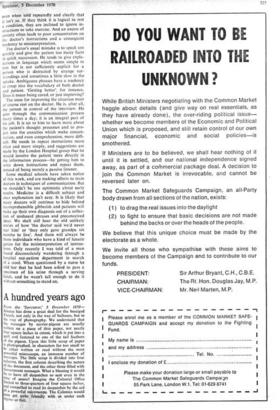MEDICINE
Vowel functionS
JOHN ROWAN WILSO\
There has been alarm expressed about the number of doctors now working in our hos.
pitals with a less than perfect command of
the English language. Indian and Pakistani doctors who fondly imagine themselves to be
bilingual are evidently thrown into a state of confusion when confronted with the in- habitants of Barnsley or Merthr Tydfil. I can
sympathise with them. As a casualty officer in Sheffield, I remember being totally baffled by words like `mardy' and `nesh', and such laconic descriptive sentences as laimed 'isself laikin' i't' coiloil'. And I had come from only thirty miles away.
No doubt my patients found me just as difficult to understand. Doctor-patient corn• munication is a two-way traffic, and pretty
defective at most levels. As students we used to be given a certain amount of rough in• struction on the subject. We were taught that there were two mistakes to be avoided at at costs: the use of obscure scientific terms or an affront to the -patient's sense of decency
in describing natural functions. Medical
jargon and four-letter words were both out. Over the years this had led to a strange
new language known as 'clinic English'. In this, people neither peed nor defecated: they `passed their water' or 'moved their bowels.
We learned to refer delicately to the pipe and the back passage, and to realise that when a woman said she hadn't seen any- thing for three months, she didn't want the ophthalmic department but the ante-natal clinic.
Even so, many of us had a suspicion that half the time - we weren't really getting through, and that patients only too often said they understood us when they hadn't the faintest idea what we were talking about. This suspicion has now been confirmed by a series of experimental studies, in which patients were given detailed explanations and instructions and then taken off and ques- tioned, to elicit how much they remembered. One of the best of these studies was done at the London Hospital, using sixty-four con- secutive attenders at the Department of Physical Medicine and Rheumatology. They were divided between two. different physi- cians and two different assessors. The results were surprisingly uniform. It was discovered that in almost every case, only about half the information given was retained by the patient. There were some interesting variations in the way patients reacted to different kinds of information. Of information about fur- ther investigations or repeat visits to the doctor three-quarters was retained; instruc- tions about regime and treatment were understood in under half the cases; and quite the worst category was explanation about the causes of the disease or the logic behind the treatment. Of this only 31 per cent was retained.
This ties in pretty well with one's perso- nal experience. I don't think it is possible to put the failure of communication down tu any one cause. As far as patients are con- cerned, one of the main troubles is their tendency to hold on to preconceived ideas. For instance, if they believe they have arthri. tis they are loath to abandon the diagnosis,
even when told repeatedly and clearly that it isn't so. If they think it is logical to rest a condition, they are inclined to ignore in- structions to take exercise. And an excess of anxiety often leads to poor concentration on the doctor's instructions and a consequent tendency to misinterpretation.
The doctor's usual mistake is to speak too quickly and give the patient too many facts in quick succession. He tends to give expla- nations in language which seems simple to him but is not sufficiently explicit for a person who is distracted by strange sur- roundings and sometimes a little slow in the uptake. Ambiguous phrases have a tendency to creep into the vocabulary of both doctor and patient. 'Getting better', for instance. Does it mean being cured, or just improving?
The onus for improving the situation must of course rest on the doctor. He is, after all, the person in control of the interview. He goes through the communication process many times a day; it is an integral part of his job. It is up to him to learn more about the patient's thought processes and to pro- ject into the anxieties which make concen- tration, and even comprehension, more diffi- cult. He needs to repeat instructions more often and more simply, and suggestions are made by the London Hospital group that he should involve the patient more directly in the information process—by getting him to write down instructions and repeat them, instead of being merely a passive listener.
Some medical schools have taken notice of this work, and are making efforts to train doctors in techniques of communication. But we shouldn't be too optimistic about early results. Medicine is a difficult subject and clear explanation isn't easy. It is likely that many doctors will continue to hide behind incomprehensible gibberish and patients will make up their own diagnosis out of a collec- tion of misheard phrases and preconceived ideas. We shall still hear the old unlikely stories of how 'the doctor said we'd never rear him' or 'they only gave grandpa six months to live'. And there will always be those individuals who have a kind of lunatic genius for the misinterpretation of instruc- tions. Only recently I was told of a man found disconsolately wandering through a hospital out-patient department in search of a stool. When questioned by a nurse he told her that he had been asked to pass a specimen of his urine through a serving hatch, and he wasn't tall enough to do it without something to stand on.



































































 Previous page
Previous page